#Olivia Langdon Clemens
Explore tagged Tumblr posts
Text
“Empezar, es el secreto de salir adelante”
Mark Twain

Su nombre real era Samuel Langhorne Clemens, fue un escritor, orador, inventor y humorista estadounidense nacido en Florida Missouri en 1835.
Conocido mundialmente por su novela “Las aventuras de Tom Sawyer” y su secuela “Las aventuras de Huckleberry Finn” trabajó en sus inicios como aprendiz de impresor y cajista. Después de trabajar como impresor en varias ciudades, se hizo piloto navegante en el rio Misisipi de los famosos vapores de ruedas, era el sexto de siete hermanos.
El padre de Samuel murió cuando tenía 11 años de edad, y cuando estalló la guerra de secesión participó brevemente del lado de los confederados.
En un viaje a Virginia Nevada, encontró trabajo en un pequeño diario de la ciudad en donde utilizó por primera vez el seudónimo de Mark Twain, nombre adoptado de una expresión negra de los cantos de trabajo que usaban en los riverboats en el río Mississippi.
Su primer éxito como escritor fue a los 30 años de edad en 1865 con el cuento corto titulado “La famosa rana cantarina de calaveras” que apareció en un periódico firmado ya con el seudónimo de Mark Twain y que lo convirtió en una personalidad reconocida a nivel nacional y le permitió viajar y dar conferencias.
Viajó a San Francisco como periodista y viajó a la Polinesia y a Europa, relatando sus experiencias en el libro de viajes “Los inocentes en el extranjero” en 1869 y “A la brega” en 1872.
Contrajo matrimonio con Olivia Langdon y se estableció en Connecticut, en donde 6 años más tarde publicó la primera novela que le daría fama “Las aventuras de Tom Sawyer” basada en su infancia a orillas del Mississippi.
Sin embargo, su talento literario se encumbró plenamente con la novela “Las aventuras de Huckleberry Finn” en 1882, una obra maestra y sin duda, una de las más destacadas de la literatura estadounidense.
Twain a lo largo de su vida mostró gran interés por la ciencia, fue gran amigo de Nicola Tesla y llegó a patentar tres inventos, de los cuales por uno de ellos prácticamente quedó en la bancarrota. Perdió no solo la mayor parte de sus ingresos obtenidos por sus libros sino también una parte sustancial de la herencia de su esposa.
En 1907 recibió el título de doctor Honoris Causa por la Universidad de Oxford y murió a los 74 años de edad después de una serie de desgracias personales, entre ellas la muerte de sus hijas y de su esposa.
En una de sus últimas novelas, titulada “El forastero misterioso”, manifestaba que se sentía como un visitante sobrenatural, llegado junto con el cometa Halley, y que había que abandonar la tierra con la siguiente aparición, cumpliéndose su deseo de morir con la partida del cometa Halley.
Fuente: Wikipedia, biografiasyvidas.com
#estados unidos#mark twain#novelistas#frases de novelistas#frases de reflexion#citas de la vida#citas de escritores#escritores#frases de escritores#citas de reflexion#missouri#mississippi
2 notes
·
View notes
Text
Introduction
I am Dylan McGrann, an art major and English minor at the University of Montevallo. I tend to obsess over contradictions, among other things. I’m not always sure why. Sometimes this obsession is a concern for what is ‘true,’ but I also think this obsession is partly a function of identity and self awareness. I was born in Birmingham, Alabama and have lived in Alabama all my life. However, my family is not from Alabama. My father’s side is scattered along the northeast coast, and my mother’s California and Texas. My parents met in California, and when I was born my parents had not lived in Alabama for even a year. Growing up here, I’ve always been very aware of this. I never truly ‘fit in’ growing up. Some would ask when meeting me ‘Where I’m from?’, some even if I’m from Europe. And being gay and autistic have shaped my sense of being in the South as well. As a child I never felt I was truly ‘from’ the South. I share this not just to paint a portrait of myself, but because it relates to how I’ve encountered Mark Twain over the years.
Entering this course on Mark Twain, I feel very familiar but also hardly familiar with the author. My first memory of Mark Twain is actually not from literature but television in an episode of Star Trek: The Next Generation. While I was only 8 at the time, the character still made some impression on me, the show depicting him a quirky, jovial yet cynical old man, and clearly some kind of performed voice for Americana that I could recognize but not sufficiently grasp. Years later I first read The Adventures of Huckleberry Finn in high school at 14 and learned more about him formally. This is when I truly came to understand him as a figure. That Mark Twain was his pen name. That he piloted steam boats on the Mississippi. That he traveled much and was inspired by characters he met while traveling. And that he was funny, and still reads funny today.
I actually read The Adventures of Huckleberry Finn twice in high school. The first time when I was in a pre-I.B. program with an alternative curriculum where we read many state-required readings early in 9th grade. But later I had to drop the program. This is when I was diagnosed with autism and was medicated for the first time. While I did improve, I remained in standard classes where I read The Adventures of Huckleberry Finn a second time, but this time a bit differently. In this class, there was something different about the teacher’s investment in the book. It was a kind of romanticism of the South that had eluded me somewhat in the prior class. Where before we discussed in detail for days the use of racist language, how how such language could be interpreted and should be read carefully, now we simply read it out loud in class with only a short warning from the teacher but focused much more on how Huck is characterized. And in the second reading there was an emphasis on setting that I could tell was important to the teacher and some students. It was then I began to sense a kind of plurality existed in Mark Twain. I encountered this in Mark Twain outside of school too. Often in quotes online or in memes, and from a wide variety of people. People who might appreciate his humor, his brash yet subversive attitude, or his opinions on cats. Mark Twain (or Samuel Clemens) clearly built an enduring voice in American culture that meets a wide range of perspectives.
Reading Justin Kaplan’s biography Mr. Clemens and Mark Twain: A Biography, Mark Twain truly seems to embody this contradiction of perspectives more than I imagined before. For instance, his performance of Christian piety for Mary Fairbanks or Olivia Langdon are not simply fake but ‘honestly’ fake. It’s a peculiar sort of performance that hinges less on the purported desire for them to make Mark Twain into a devout Christian, but rather their desire for their belief to be acknowledged. For Twain this kind of performativeness serves as a device to not just acknowledge others, but to retain civility or respect all while maintaining the honesty of his critical perspective. But Mark Twain as described by Kaplan seems to have genuinely wanted the admiration of others as well. His willingness to seemingly suspend himself for this purpose is more extensive than I had understood before.
I didn’t previously appreciate how literally performative his carrier was. Mark Twain was not merely a pen name, but a built-up character and alter-ego of sorts. He spent so much of his time physically engaged with audiences. He does not only belong to a canon of American authors, but also as a humorist, American comedians too. It’s hard for me to not simply compare Twain in his own time to observations of our present. These days as an adult, I‘m not so bothered by whether I’m from the South—it’s a simple fact that I am. Now I know that feeling I used to have, if not common, is widespread in the South as well as the United States generally. Another thing I learned about Twain in the last two weeks is that Samuel Clemens had this feeling too in his own way. Perhaps this is partly why Mark Twain as a figure and writer continues to resonate. His navigating of a Victorian & Gilded Era United States bears some of the same marks of culture today—a public divided on theological, racial, and class lines that may have improved but not fundamentally changed since.
But I want to understand Twain and his moment on their own terms as well. I look forward to reading more as the course explores his body of work. Going forward here, I won’t dwell so much on myself, but hopefully you have an idea of where I’m coming from.
0 notes
Text
I really seriously need Winona Ryder to play Mark Twain’s wife in a comedy biopic
0 notes
Photo

Samuel Clemens (Mark Twain) Autographed Letter, 1890-08-06 trimmed and laid on board w/ original copies of the letter verso (framed) 13 1/2″ x 9″
pag her, but - (I knew what she [Olivia Langdon Clemens] would say!) - She is habituated to obscurity and prefers to remain in it. Privately I believe she thinks that to be merely proprietor of a cannon cannot warrant one in letting on to be part of the battery.” Sincerely Yours, S L Clemens.
(via Bonhams)
0 notes
Photo


[“A man’s character may be learned from the adjectives which he habitually uses in conversation.” – Olivia Langdon Clemens’s Commonplace Book.]
#something wicked this way comes#quote#ray bradbury#ron wimberly#olivia langdon clemens#ps i literally hate that it's an 's' with an apostrophe-s after bc that is uhhh incorrect and looks bad but word for word man yknow
1 note
·
View note
Text
Hannibal and Florida, Missouri, in Search of Mark Twain
Mark Twain Memorial Bridge on the Missouri River, view from the riverside at the foot of Hill St, Hannibal, Missouri
Journal: Hannibal, Missouri, evening of July 31st, 2017
I’m sitting here on the waterfront between the Mississippi River and the train tracks, facing northwest. My back is leaning against a stone wall. The train whistle was deafening, but now the engine has passed and the freight…
View On WordPress
#Abolition#Abraham Lincoln#American Literature#Clara Clemens#Florida Missouri#Hannibal Missouri#Huckleberry Finn#Jean Clemens#Joan of Arc#John Marshall Clemens#Lighthouse#Mark Twain#Mark Twain Birthplace#Mark Twain Bridge#Mark Twain&039;s Birthplace#Mississippi River#Norman Rockwell#Olivia Langdon Clemens#Orion Clemens#Samuel Clemens#Slavery#Susy Clemens#The Riddle Of Mark Twain’s Passion For Joan Of Arc#Tom Sawyer
0 notes
Text

Thursday, January 16, 2025
Still more work on Web of History today. Here's another one of my favorite images in the exhibit. It shows Livy and Sam Clemens together in New York City in 1900.
0 notes
Text
Twain’s Literary Love
To celebrate love and romance, today we will be making posts about the different kinds of love found in our collections. Starting with the literary love letters of Mark Twain.

This compilation of letters from Samuel L. Clemens (Twain) to his wife Olivia Langdon documents their relationship through their courtship, engagement, and marriage.
On March 6, 1869 he writes sweetly to his betrothed “...as the dew loves the flowers; as the birds love the sunshine; as the wavelets love the breeze; as mothers love their first-born; as memory loves old faces; as the yearning tides love the moon; as the angels love the pure in heart.”
Continuing to write about his life, such as who he has and has not visited, how “perfectly awful” it is when his sister spells John with a G, how he doesn’t mind when his love misspells, and reflecting on receiving and responding to letters from her, he closes “Yours, forever & always, Sam”
The best part of this letter, however, comes when he critiques his own writing and asks Livy to burn it.
“P.S. I have read this letter over & it is flippant, & foolish, & puppyish. I wish I had gone to bed when I got back, without writing. You said I must never tear up a letter after writing it to you --& so I send it. Burn it Livy--I did not think I was writing so clownishly & shabbily. I was in much too good a humor for sensible letter writing.” (Mark Twain Collection)
#marktwain#similes of love#literary love#keeping promises#burn the letter#glad she didn't listen#love#love letters#happy valentines day#uidahospecialcollections
10 notes
·
View notes
Text
MARK TWAIN
El 30 de Noviembre de 1835 en Missouri (EEUU) , nacía el brillante escritor norteamericano Mark Twain. Bautizado con el nombre de Samuel Langhorne Clemens, creció en Hannibal a orillas del Mississippi, esos paisajes y el esclavismo estarían presentes en la mayoría de sus obras. Trabajó desde muy temprana edad como aprendiz de impresor. Por su sagacidad y buen humor, su jefe lo invitó a escribir en notas ingeniosas en varios periódicos zonales. Se le presentó la posibilidad de ser piloto navegante de vapores a ruedas en el Río Mississippi, no dudó en cambiar de oficio, aunque nunca abandonó su pasión por la escritura, llevaba notas de sus propias aventuras y otras que le contaban los lugareños. En 1865 le ofrecen compartir todas sus experiencias como navegante y minero, fruto de ello es "La célebre rana saltarina del condado de Calaveras", el éxito de la publicación le llevó a darse cuenta de su vocación como escritor de diarios de viajes. Se hizo amigo personal de Nikola Tesla quien lo anima a tomar mas riesgos en busca de su realización personal, su desinhibición para la crítica y el sarcasmo lo hicieron muy popular, varios presidentes de los EEUU buscaron su amistad. Como periodista, viajó a San Francisco, donde conoció al escritor Bret Harte, quien le animó a proseguir su carrera literaria. Empezó entonces una etapa de continuos viajes, como periodista y conferenciante, que le llevaron a Polinesia y Europa, y cuyas experiencias relató en el libro de viajes Los inocentes en el extranjero (1869), al que siguió A la brega (1872), en el que recrea sus aventuras por el Oeste. Tras contraer matrimonio en 1870 con Olivia Langdon, se estableció en Connecticut. Seis años más tarde publicó la primera novela que le daría fama, Las aventuras de Tom Sawyer.
La publicación de "Las aventuras de Tom Sawyer" le abrió las puertas del mundo literario y trajeron una pequeña fortuna que dilapidó al no tener visión empresarial. Las sucesivas "Las aventuras de Huckleberry Finn", "Un yanqui en la corte del Rey Arturo" y "El príncipe y el mendigo" lo elevaron a autor imprescindible de la lengua inglesa. Su marcado anti imperialismo, oposición a las guerras de expansión norteamericana, sumado a su sabido apoyo al abolicionismo y emancipación de los esclavos, solían traerle dolores de cabeza pero nadie se animaba a polemizar con él. Con un estilo popular, lleno de humor, Mark Twain contrapone en estas obras el mundo idealizado de la infancia, inocente y a la vez pícaro, con una concepción desencantada del hombre adulto, el hombre de la era industrial, de la "edad dorada" que siguió a la guerra civil, engañado por la moralidad y la civilización. En sus obras posteriores, sin embargo, el sentido del humor y la frescura del mundo infantil evocado dejan paso a un pesimismo y a una amargura cada vez más patente, aunque expresada con ironía y sarcasmo.
Una serie de desgracias personales, entre ellas la muerte de una de sus hijas y de su esposa, así como un grave quebranto económico, ensombrecieron los últimos años de su vida.
Nacido en 1835 año de la visita del Cometa Halley solía decir, "Vine con él y me iré con él", como un capricho del destino el 21 de Abril de 1910, el día anterior al perihelio de la nueva llegada del cometa a la tierra, Twain sufre un ataque al corazón que le provoca la muerte, sus restos descansan en el Cementerio Woodlawn de New York.
https://www.biografiasyvidas.com/biografia/t/twain.htm



0 notes
Photo


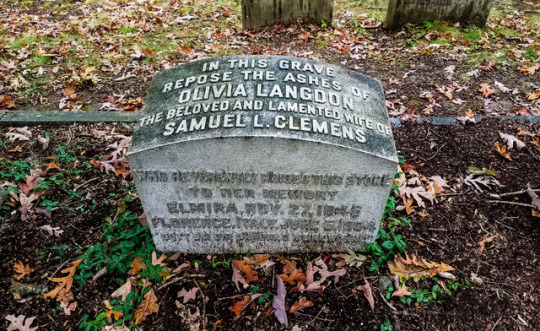
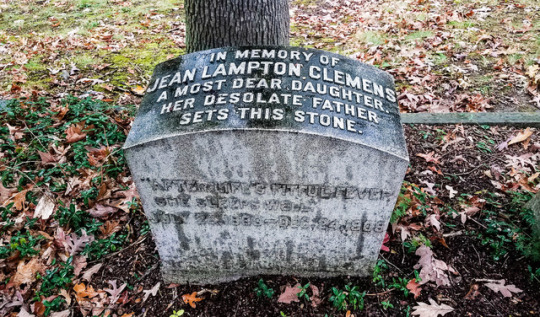

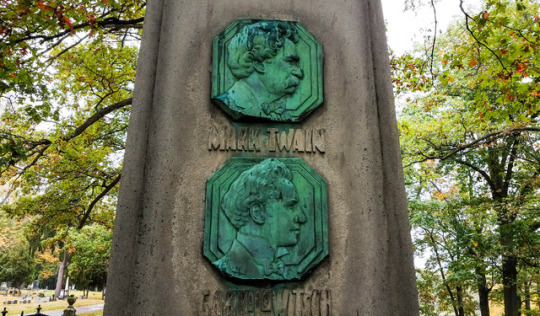


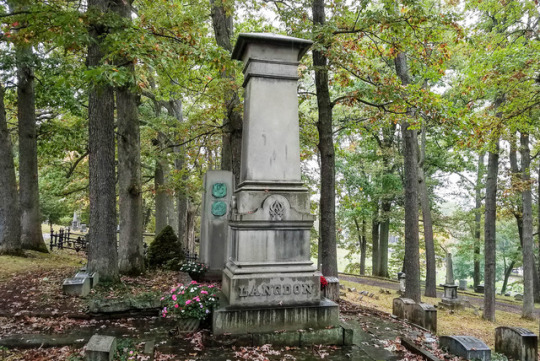
A visit to the Clemens and Langdon family plots at Woodlawn Cemetery in Elmira, New York--final resting place of Mark Twain and family members, and the family of his wife Olivia Langdon Clemens. Photos taken October 11, 2017.
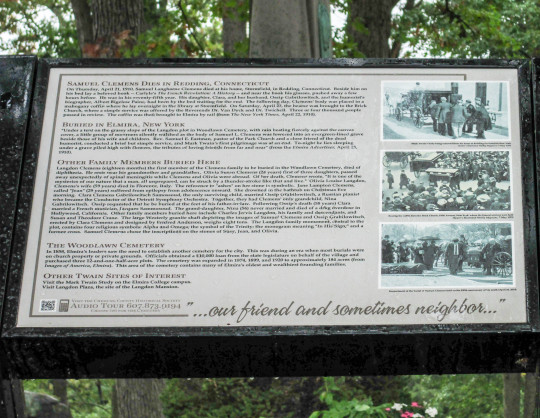
77 notes
·
View notes
Text
Olivia Langdon Clemens, Mark Twain's Wife
While you’ve read Mark Twain’s works and have probably quoted him, you might not know much about Samuel Clemens’ personal life. Clemens made friends with Charles Langdon on his trip to the Holy Land in 1868, and later met his younger sister Olivia. Olivia was educated, devout, progressive, and chronically ill, possibly with tuberculosis. […]
The post Olivia Langdon Clemens, Mark Twain's Wife appeared first on AWorkstation.com.
source https://aworkstation.com/olivia-langdon-clemens-mark-twains-wife/
0 notes
Text
Out of the depths of my happy heart wells a great tide of love and prayer for this priceless treasure that is confided to my life-long keeping. You cannot see its intangible waves as they flow towards you, darling, but in these lines you will hear, as it were, the distant beating of the surf. -Mark Twain (Samuel Langhorne Clemens), American writer, to Olivia Langdon, his future wife.
1 note
·
View note
Photo
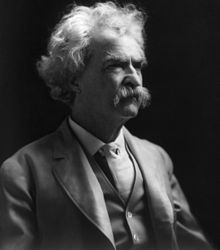
Mark Twain
Samuel Langhorne Clemens known by his pen name Mark Twain, was an American writer, humorist, entrepreneur, publisher, and lecturer. He was lauded as the "greatest humorist this country has produced", and William Faulkner called him "the father of American literature".His novels include The Adventures of Tom Sawyer (1876) and its sequel, the Adventures of Huckleberry Finn (1884), the latter often called "The Great American Novel".
Born: Samuel Langhorne Clemens November 30, 1835 Florida, Missouri, U.S.
Died: April 21, 1910 (aged 74) Redding, Connecticut, U.S.
Resting place: Woodlawn Cemetery, Elmira, New York, U.S.
Pen name: Mark Twain, Josh, Thomas Jefferson Snodgrass
Occupation: Writer, humorist, entrepreneur, publisher, lecturer
Spouse: Olivia Langdon Clemens (m. 1870; died 1904)
Children: 4 including Susy, Clara and Jean
Relatives:John Marshall Clemens (father), Orion Clemens (brother)
0 notes
Text
14 Beautiful Love Letter Excerpts From Famous Folks Throughout History
It’s always nice to let your special someone know just how much you truly care about them. Obviously, how you say it varies from couple to couple, but there’s nothing quite like sending off a sweet message and knowing just how big a smile it will put on their face.
In today’s technology-dominated society, that’s come tomean typing out a text with carefully plotted emojis or perhaps going “old school” with a flowing email of affection.
While those are nice, there’s reallyno denying that theylack acertain charmthat so many romantic exchanges in the pasthad. That’s never more clear than in the beautiful words famous folks throughout history have strung together to let their loved ones knowexactly how they felt.
Of course we expect this sort of flowery language from renowned writers (some of which are includedbelow), butyou might be surprised by just how sweet some of the others were when it came to expressing what was in their heart.
Take a look and let us know if we forgot anyprecious messages you’ve seen from the past.
And don’t forget to SHARE with your friends and family!
Thumbnail source: Wikimedia Commons
Like our Page
Share on Facebook
Share on Facebook
1. Ernest Hemingway To Marlene Dietrich
Wikimedia Commons
“I can’t say how every time I ever put my arms around you I felt that I was home. Nor too many things. But we were always cheerful and jokers together.”
The author and actresstraded lettersfor nearly three decades without ever getting their timing right for an actual romantic relationship.
2. Napoleon Bonaparte To Josphine de Beauharnais
Wikimedia Commmons
“Since I left you, I have been constantly depressed. My happiness is to be near you. Incessantly I live over in my memory your caresses, your tears, your affectionate solicitude. The charms of the incomparable Josphine kindle continually a burning and a glowing flame in my heart.”
Despite his affectionate words, the pair eventually split up when Napoleon sought a new wife to give him a male heir.
3. Richard Burton To Elizabeth Taylor
Wikimedia Commons
“My blind eyes are desperately waiting for the sight of you. You dont realise of course, E.B., how fascinatingly beautiful you have always been, and how strangely you have acquired an added and special and dangerous loveliness.”
It clearly wasn’t just the headline writers who had a way with wordsthroughout this iconic couple’s bumpy relationship.
4. King Henry VIII To Anne Boleyn
Wikimedia Commons
“I beg to know expressly your intention touching the love between us. Necessity compels me to obtain this answer, having been more than a year wounded by the dart of love, and not yet sure whether I shall fail or find a place in your affection.”
The king, who is notorious for walking down the aisle six times in his attempts to have a male heir, wrote this particularly moving note to his second wife while still married to his first.
5. Ludwig van Beethoven To “Immortal Beloved”
Wikimedia Commons
“We shall probably soon meet, even today I cannot communicate my remarks to you, which during these days I made about my life were our hearts close together, I should probably not make any such remarks. My bosom is full, to tell you much there are moments when I find that speech is nothing at all. Brighten up remain my true and only treasure, my all, as I to you. The rest the gods must send, what must be for us and shall.”
Unfortunately, the composer’s “beloved” remains a mystery to this day.
6. Frida Kahlo To Diego Rivera
Wikimedia Commons
“Diego, my love,
“Remember that once you finish the fresco we will be together forever once and for all, without arguments or anything, only to love one another.
“Behave yourself and do everything that Emmy Lou tells you.
“I adore you more than ever. Your girl, Frida
“(Write me)”
Frida sent this sweet letter to Diego while he was away painting a mural at City College in San Diego.
7. John Keats To Fanny Brawne
Wikimedia Commons
“My love has made me selfish. I cannot exist without you I am forgetful of every thing but seeing you again my Life seems to stop there I see no further. You have absorbd me. I have a sensation at the present moment as though I was dissolving I should be exquisitely miserable without the hope of soon seeing you.”
The English poet was particularly inspired to write after falling for Fanny at first sight, butthey sadly never married due to her mother’s disapproval.
8. Abigail Adams To John Adams
Wikimedia Commons
“Should I draw you the picture of my Heart, it would be what I hope you would Love; tho it contained nothing new; the early possession you obtained there; and the absolute power you have ever maintained over it; leaves not the smallest space unoccupied.
“I look back to the early days of our acquaintance; and Friendship, as to the days of Love and Innocence; and with an indescribable pleasure I have seen near a score of years roll over our Heads, with an affection heightened and improved by time nor have the dreary years of absence in the smallest degree effaced from my mind the Image of the dear untitled man to whom I gave my Heart.”
Abigail sent this to her “dearest friend” before heading across the ocean for a trip to Holland during John’s presidency.
9. Johnny Cash To June Carter Cash
Wikimedia Commons
“We get old and get used to each other. We think alike. We read each others minds. We know what the other one wants without asking. Sometimes we irritate each other a little bit. Maybe sometimes take each other for granted.
“But once in a while, like today, I meditate on it and realize how lucky I am to share my life with the greatest woman I ever met. You still fascinate and inspire me. You influence me for the better. Youre the object of my desire, the #1 earthly reason for my existence. I love you very much.”
These kind words were shared on June’s birthday in 1994, clearly proving the classic country pair’s love was the real deal.
10. Voltaire To Olympe Dunover
Wikimedia Commons
“I am a prisoner here in the name of the King; they can take my life, but not the love that I feel for you. Yes, my adorable mistress, to-night I shall see you, and if I had to put my head on the block to do it.
“No, nothing has the power to part me from you; our love is based upon virtue, and will last as long as our lives. Adieu, there is nothing that I will not brave for your sake; you deserve much more than that. Adieu, my dear heart!”
TheCandide authorwrote this note for Olympe, who unfortunately doesn’t seem to have a portrait available,from behind the prison walls that her mother was able to cast him into out of disapproval. He eventually escaped.
11. Elizabeth Barrett Browning To Robert Browning
Wikimedia Commons
“You have touched me more profoundly than I thought even you could have touched me my heart was full when you came here today. Henceforward I am yours for everything.”
It seems writing 44 sonnets for her husband wasn’t enough for Elizabeth, who also shared her affection in this moving letter.
12. Tsarina Alexandra To Tsar Nicholas II
Wikimedia Commons
“Off you go again alone and it’s with a very heavy heart I part from you. No more kisses and tender caresses for ever so long I want to bury myself in you, hold you tight in my arms, make you feel the intense love of mine.
“You are my very life Sweetheart, and every separation gives such endless heartache… Goodbye my Angel, Husband of my heart I envy my flowers that will accompany you. I press you tightly to my breast, kiss every sweet place with tender love…”
There are several letters from the last empress of Russia, gushing with affection for her royal husband before their family suffered from the revolution.
13. Mark Twain To Olivia Langdon Clemens
Wikimedia Commons
“Livy Darling, I am grateful grateful-er than ever before that you were born, & that your love is mine & our two lives woven & welded together!”
The humorous author kept his sentiments short, but still so sweet, in this note to his wife in 1888.
14. Winston Churchill To Clementine Churchill
Wikimedia Commons
“My darling Clemmie,
“In your letter from Madras you wrote some words very dear to me, about my having enriched your life. I cannot tell you what pleasure this gave me, because I always feel so overwhelmingly in your debt, if there can be accounts in love. What it has been to me to live all these years in your heart and companionship no phrases can convey.”
We don’t usually think of the legendary U.K. prime minister as the romantic type, but it’s really no surprise he hadthe same mastery when it came to words of love as he did with his stately speeches.
Did we miss any other famous letters of affection you’ve seen? Let us know below and be sure to SHARE with your loved ones!
Read more: http://ift.tt/2jCTtNE
from 14 Beautiful Love Letter Excerpts From Famous Folks Throughout History
2 notes
·
View notes
Video
youtube
The Diaries of Adam and Eve ♦ By Mark Twain ♦ (Humorous fiction) ♦ Audio...
Title: The Diaries of Adam and Eve
Author: Mark TWAIN
Genre: Humorous Fiction
Language: English
Read By: Phil Chenevert
Librivox Recording
Mark Twain wrote these two diaries, or rather as he insists, 'translated them from the original manuscripts', late in his writing career. The freshness, wonder and excitement of exploring a new world permeates Eve's thoughts as she takes great joy in her very existence and loves everything about it. To me this is obviously a posthumous love-letter to Twain's wife Olivia Langdon Clemens, or Livy, who died in June 1904, but others may disagree. Adam's diary is different and he comes across as a somewhat surly person who just wants to be alone and think his thoughts. he is also not very bright. How the two finally come together is what makes these stories so wonderful and expresses the love between a husband and wife. They were written as two separate works but fit together so well I have combined them into one here. - Summary by phil chenevert
Visit me on Tumblr at https://www.tumblr.com/blog/chipslater
Follow me on Facebook at https://www.facebook.com/ChipSlatersStorytimeTheater/
Visit me on Blogger at https://chipslater.blogspot.com/
#MarkTWAIN #Audiobook #TheDiariesofAdamandEve #Fiction #Humor #ShortStory
0 notes